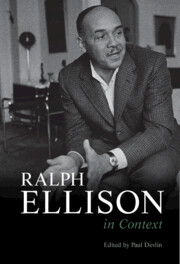Book contents
- Ralph Ellison in Context
- Ralph Ellison in Context
- Copyright page
- Contents
- Figures
- Notes on Contributors
- Abbreviations
- Introduction
- Part I Geographical, Institutional, and Interpersonal Contexts
- Part II Historical, Political, and Cultural Contexts
- Chapter 10 Visualizing Black Identity in Ellison’s Fiction
- Chapter 11 Alternating Currents: Electricity, Humanism, and Resistance
- Chapter 12 Sounds and Signs of Black Womanhood
- Chapter 13 Masculinity
- Chapter 14 Aesthetics of Democracy
- Chapter 15 Black Power and Black Arts
- Chapter 16 Wrestling with the Far Right: Ellison’s Representations of Fascism
- Chapter 17 Southwestern Swing
- Chapter 18 The Self-Fashioned American Blues Identity
- Chapter 19 Ellison’s Durational View of Bebop
- Part III Literary and Critical Contexts
- Part IV Reception and Reputation
- Index
Chapter 12 - Sounds and Signs of Black Womanhood
from Part II - Historical, Political, and Cultural Contexts
Published online by Cambridge University Press: 14 January 2022
- Ralph Ellison in Context
- Ralph Ellison in Context
- Copyright page
- Contents
- Figures
- Notes on Contributors
- Abbreviations
- Introduction
- Part I Geographical, Institutional, and Interpersonal Contexts
- Part II Historical, Political, and Cultural Contexts
- Chapter 10 Visualizing Black Identity in Ellison’s Fiction
- Chapter 11 Alternating Currents: Electricity, Humanism, and Resistance
- Chapter 12 Sounds and Signs of Black Womanhood
- Chapter 13 Masculinity
- Chapter 14 Aesthetics of Democracy
- Chapter 15 Black Power and Black Arts
- Chapter 16 Wrestling with the Far Right: Ellison’s Representations of Fascism
- Chapter 17 Southwestern Swing
- Chapter 18 The Self-Fashioned American Blues Identity
- Chapter 19 Ellison’s Durational View of Bebop
- Part III Literary and Critical Contexts
- Part IV Reception and Reputation
- Index
Summary
This chapter traces black womanhood in Ellison’s writing to posit that he deploys a distinctly sonic figural aesthetic in his depictions black women that resounds with yet understudied meaning. Given Ellison’s stylistic attention to sound and music, interrogating the roles of black women as producers, performers, interpreters and instructors of sound and music reveals novel insights about the complex gendered dynamics of Ellison’s oeuvre. Oscillating between Invisible Man, “The Little Man at Chehaw Station” and “As the Spirit Moves Mahalia,” this chapter charts the soundings of black women to theorize about their pivotal role in structuring Ellison’s most well-known works
- Type
- Chapter
- Information
- Ralph Ellison in Context , pp. 137 - 146Publisher: Cambridge University PressPrint publication year: 2021

